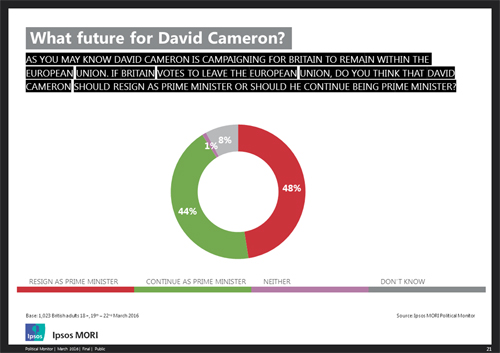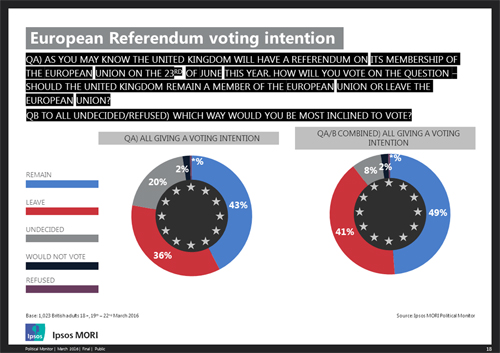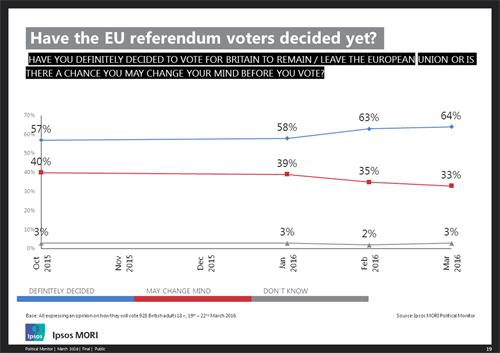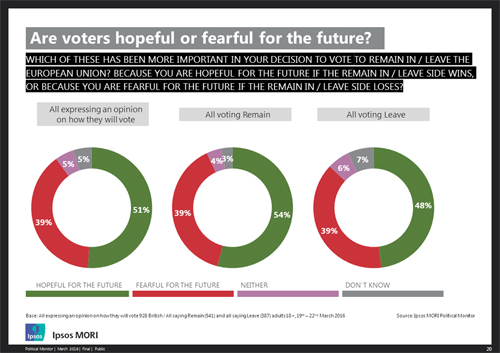Half think David Cameron should resign as Prime Minister if Britain votes to leave the EU
As David Cameron continues to campaign for Britain to stay in the European Union, Ipsos’s Political Monitor finds that almost half of the public believes he should step down from being Prime Minister if the British people choose Brexit on 23 June. The poll finds that just under half (48%) think he should resign in that scenario while 44% think he should continue as Prime Minister. This sentiment is split along party lines with one in three (34%) Conservatives saying he should resign (63% think he should continue) as do 38% of Liberal Democrats (54% think he should continue). This compares to 56% of Labour supporters (38% think he should continue), and seven in ten (70%) UKIP supporters (22% think he should continue).

The survey also reveals that “remain” maintains a lead over Brexit by 8 points. Half (49%) would vote to remain in the European Union on 23 June compared to 41% saying they would vote to leave. It is important to note some changes to the way we now ask the question. Since the referendum question last month the date of the vote has been announced so as a result we have slightly modified the question to include a preamble reflecting this. We also now include a follow-up question asking which way the respondent would be most inclined to vote for those who are either undecided or refused, in line with how we ask our General Election question. Now that the referendum date has been set, we have also stopped asking our long-term trend question, and are just using the referendum question itself.
If we were to apply the same turnout filter that would have given us the most accurate results in the 2015 general election (combining stated likelihood to vote with how regularly people vote in previous elections), then the lead is much narrower, at 2 points (remain is on 48%, leave 46%). However it is important to note that turnout at the referendum may be different from turnout at a general election. Estimating turnout is one of the crucial challenges in polling at any election, and for this referendum we have no recent comparable precedents to help us. The campaign may unfold unpredictably. So we will continue testing different methods of estimating turnout during the campaign, and may show figures based on a different range of turnout scenarios in the future.

The poll shows that there has been little change in the last month when it comes to people changing their minds on how they will vote in the referendum. Two in three (64%) say they have definitely made up their mind (up 1 point) and one in three (33%) say they may change their mind (down 2 points). Those who wish to leave the European Union appear more firm in their position than those who say they will vote to remain. Just over two-thirds (68%) of those who said they will vote for Brexit also say they have definitely made up their mind (30% may change their mind) compared to three in five (60%) of those saying they would vote to stay (36% may change their mind).

Hope, rather than fear, is the reason most Britons will vote one way or the other on 23 June. When asked ‘which has been more important in your decision to vote to remain or leave’ half (51%) say it is because they are hopeful for the future if their side wins while 39% say it is because they are fearful if their side loses. Unlike in the Scottish referendum (when independence supporters were more motivated by hope than those who wanted to stay in the United Kingdom) there is no difference between the two sides, with half (54%) of those voting remain say it is because they are hopeful (39% say fear) as do 48% of those voting to leave (39% say fear).

Gideon Skinner, Head of Political Research at Ipsos, said:
“David Cameron is crucial to the remain side campaign as the most important politician to how people will vote, but the flip side of this is that many Britons think his premiership should end if the country votes for Brexit. Meanwhile, remain keeps a narrow lead over leave, but it gets narrower still when we just look at those who say they are most likely to vote.”Technical note Ipsos interviewed a representative sample of 1,023 adults aged 18+ across Great Britain. Interviews were conducted by telephone 19-22 March 2016. Data are weighted to match the profile of the population.



